|
|
|
Sort Order |
|
|
|
Items / Page
|
|
|
|
|
|
|
| Srl | Item |
| 1 |
ID:
171170
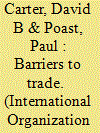

|
|
|
|
|
| Summary/Abstract |
Since trade must cross borders, to what extent do border walls affect trade flows? We argue that border walls can reduce trade flows. Even if the objective is to only stem illicit flows, border walls heighten “border effects” that can also inhibit legal cross-border flows. Using a gravity model of trade that reflects recent developments in both economic theory and econometrics, we find that the creation of a wall is associated with a reduction in legal trade flows between neighboring countries. We provide a battery of evidence that suggests this reduction is not simply a function of worsening bilateral relations. Our findings have implications for understanding how governments have taken measures to assert sovereign control of their borders in an age of increasing economic globalization.
|
|
|
|
|
|
|
|
|
|
|
|
|
|
|
|
| 2 |
ID:
112134
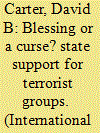

|
|
|
|
|
| Publication |
2012.
|
| Summary/Abstract |
Little existing work has systematically examined the factors that help terrorist groups survive or contribute to their failure. State support for terrorist groups is commonly thought to be a factor that helps groups to survive. I demonstrate with newly collected data that state sponsorship is not always helpful to terrorist groups. The resources provided by sponsors increase a group's ability to maintain itself internally. However, when a group has a sponsor that provides it with safe haven, the risk of the group being forcefully eliminated by the target increases. I argue that sponsors that provide safe haven can have incentives to provide information to the target about the groups to avoid potential costs from target military operations within their territory. The key empirical findings suggest that state sponsorship is a less serious problem for target states than many previously thought.
|
|
|
|
|
|
|
|
|
|
|
|
|
|
|
|
| 3 |
ID:
141846
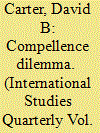

|
|
|
|
|
| Summary/Abstract |
This article introduces the idea of a compellence dilemma. This dilemma arises when the domestic policies of adversaries—such as hosting violent groups—threaten states’ security. Such states often consider coercive instruments to compel their adversary to change those policies. The problem? The prospect of costly punishment makes cooperation more attractive for the adversary. However, if they fail to coerce policy change, harsh punishments can reduce the adversary's capacity to enact policy change and induce harmful domestic instability. These problems are compounded by the fact that both the threatened states’ incentive to use costly punishments and the costs of failed compellence increase with the severity of the security threat. The logic of the compellence dilemma applies whenever a state uses damaging coercive instruments but risks failing to achieve its immediate objectives. I analyze the compellence dilemma with a dynamic game-theoretic model of interaction among a target state, host state, and violent group, and show that it is pervasive in equilibrium. I show that the compellence dilemma causes states to refrain from using harsh punishments even when they would compel the host state to cooperate. Concerns about decreasing future host-state capacity and increasing group power drive this result.
|
|
|
|
|
|
|
|
|
|
|
|
|
|
|
|
| 4 |
ID:
139787
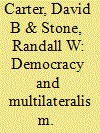

|
|
|
|
|
| Summary/Abstract |
Democracies are more supportive of US positions on important votes in the UN General Assembly than of nondemocracies. Is this because democracies share common perspectives, or does this pattern reflect coercion? Since 1985, US law has stipulated that the US State Department identify important votes and that aid disbursements reflect voting decisions. To unravel these alternative explanations, we introduce a strategic statistical model that allows us to estimate voting preferences, vulnerability to influence, and credibility of linkage, which are theoretical quantities of interest that are not directly observable. The results reject the hypothesis of shared democratic values: poor democracies have voting preferences that are more oppositional to US positions than autocracies, and they are more willing than autocracies to take symbolic stands that may cost them foreign aid. Democracies support US positions, however, because US aid linkages are more credible when directed toward democratic countries. Splitting the sample into Cold War and post–Cold War segments, we find that the end of the Cold War changed the way US linkage strategies treated allies and left- and right-leaning governments, but the effects of democracy remained constant.
|
|
|
|
|
|
|
|
|
|
|
|
|
|
|
|
| 5 |
ID:
134933
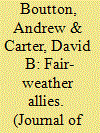

|
|
|
|
|
| Summary/Abstract |
While it is commonly assumed that the United States uses foreign aid as an instrument to combat global terrorism, it is unclear whether it views terrorist threats to other countries, particularly its allies, with urgency. We show that the relationship between transnational terrorism and foreign aid flows is strongly conditional on whether terrorist activity based in a potential recipient directly threatens the United States. Using data on terrorist attacks and casualties in potential recipient countries, we demonstrate that terrorist activity based within a state’s borders, which targets US interests is a strong determinant of both whether that state receives any aid and also how much aid it receives. In contrast, the presence of terrorism targeted at non-US interests, even if it targets formal allies of the United States, is generally unrelated to US aid allocation. These findings suggest that the United States' use of foreign aid to fight terrorism and political violence is narrowly tailored to assist countries that directly threaten its own security, rather than those of other countries, even its allies.
|
|
|
|
|
|
|
|
|
|
|
|
|
|
|
|
| 6 |
ID:
178211
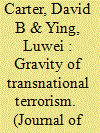

|
|
|
|
|
| Summary/Abstract |
Transnational terrorism is an inherently international phenomenon as it involves attacks where the perpetrators are from a different country than the victims. Accordingly, a growing literature explains patterns in transnational attacks with a focus on international variables, for example, the presence of a border wall or alliance patterns. Despite the importance of the topic, no common empirical framework with theoretical basis has emerged to analyze the flows of transnational attacks. We propose that recent versions of the structural gravity model of transnational flows, long the workhorse model in trade economics, can be modified to provide a theoretically motivated model of the flows of transnational terrorist attacks among countries. The gravity model provides several empirical advantages for the study of international variables and transnational terrorism, for example, recent specifications allow the researcher to estimate count models that condition out all time-varying country-level confounders with fixed effects. This facilitates sidestepping the typical problem that any international variables associated with transnational flows are often correlated with omitted or imprecisely measured domestic factors, which draws their estimates into question. Moreover, we demonstrate that the structural gravity model does a much better job in predicting outcomes, particularly when multiple attacks flow across borders.
|
|
|
|
|
|
|
|
|
|
|
|
|
|
|
|
| 7 |
ID:
149672
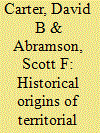

|
|
|
|
|
| Summary/Abstract |
Given the abundance of evidence that disputed territory matters, we know remarkably little about the origins of territorial claims. We argue that the presence of competing historical border precedents is central to the emergence of territorial claims. We outline why precedents provide opportunity to make claims and provide two possible explanations for why leaders have incentive to claim along precedents. One possibility is consistent with the conventional wisdom that incentive derives from territorial characteristics such as natural resources or strategic significance. A second and more novel explanation is that the persistent coordination effects of historical boundaries provide the incentive to draw claims along them. We use new data on the location of historical boundaries from the peace of Westphalia until the start of the French Revolution to show that historical border precedents drive the emergence of territorial claims after the Congress of Vienna and that persistent coordination effects provide incentive to dispute historical precedents.
|
|
|
|
|
|
|
|
|
|
|
|
|
|
|
|
| 8 |
ID:
165434
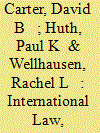

|
|
|
|
|
| Summary/Abstract |
Although contentious interstate disputes are widely known to depress foreign direct investment (FDI), we identify and explain variation in investor responses even to territorial disputes, known to be slow to resolve and prone to militarization. Forward-looking and profit-seeking investors have incentives to increase FDI when the characteristics of a dispute point toward peace. These incentives drive them to increase investment even prior to an actual settlement. Given that legal focal points—when international law identifies one side in the dispute as having a clear legal advantage—promote peace, countries in disputes with legal focal points should receive more FDI. To support this argument, we use new data on international law and territorial disputes from 1980 to 2010 to explain variation in FDI across countries, as well as variation in the timing of within-country FDI accumulation. While a growing body of work demonstrates how international law influences state behavior, we show that it also profoundly influences the investment patterns of firms.
|
|
|
|
|
|
|
|
|
|
|
|
|
|
|
|
| 9 |
ID:
158573
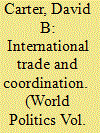

|
|
|
|
|
| Summary/Abstract |
This article examines how the institutional design of borders affects international trade. The authors explore variation in the effects of borders by comparing new international borders that follow precedent and thus have a prior institutional history with new international borders that lack such an institutional history. The former minimally disrupt—or restore—previous economic networks, while the latter fundamentally disrupt existing economic networks. A variety of empirical tests show that, consistent with this institutional perspective on borders, new international boundaries that follow precedent are associated with significantly faster recovery and greater increase in subsequent trade flows. By contrast, when new international borders are truly new, they disrupt local economic networks, introduce new transaction costs, and impose higher adjustment costs on states, which the authors show to have long-term deleterious effects on trade.
|
|
|
|
|
|
|
|
|
|
|
|
|
|
|
|
| 10 |
ID:
103890
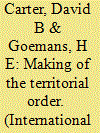

|
|
|
|
|
| Publication |
2011.
|
| Summary/Abstract |
We argue that new international borders are rarely new. We propose that when states choose new borders they use previous administrative frontiers to solve a difficult short-term bargaining problem and a long-term coordination problem. With a unique new set of data collected specifically for this project, we systematically examine the new international borders of the twentieth century resulting from secession, partition, and the use of force. New international borders, we find, are drawn not according to principles of "nationalism" or defensible borders, but rather according to previous administrative frontiers. How borders are drawn has important consequences for international stability: borders drawn along previously existing internal or external administrative frontiers experience fewer future territorial disputes and have a much lower risk of militarized confrontation if a dispute emerges.
|
|
|
|
|
|
|
|
|
|
|
|
|
|
|
|
| 11 |
ID:
145012
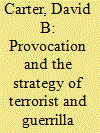

|
|
|
|
|
| Summary/Abstract |
Violent nonstate groups are usually weaker than the states they target. Theory suggests that groups carefully condition their choice of tactics on anticipated state response. Yet scholars know very little about whether and how groups strategically plan attacks in anticipation of state response. Scholars do not know if and under what conditions groups employ violent tactics to provoke or avoid a forceful state response, although extant theory is consistent with both possibilities. Relatedly, there is little systematic evidence about why groups choose terrorist or guerrilla tactics and how this choice relates to anticipated state response. I develop a theoretical and empirical model of the interaction between groups and states that generates unique evidence on all three fronts. Using data on attacks in Western Europe from 1950 to 2004, I show that guerrilla attacks are sometimes associated with provoking forceful state response, whereas terrorist attacks are generally associated with avoiding forceful response. Groups effectively choose their tactics to avoid forceful state responses that are too damaging for themselves but provoke forceful responses that disproportionately harm civilians. These findings survive several robustness and model specification tests.
|
|
|
|
|
|
|
|
|
|
|
|
|
|
|
|
| 12 |
ID:
177784
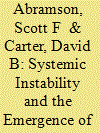

|
|
|
|
|
| Summary/Abstract |
Although evidence shows that territorial disputes fundamentally shape relations among states, we know surprisingly little about when territorial claims are made. We argue that revisionist states have incentives to make territorial claims when the great powers that manage the system are in crisis. We identify five main sources of systemic instability and develop measures of each of them, demonstrating that the majority of territorial claims in Europe are drawn at times when regional great powers are embroiled in crisis, for example, 1848 or 1870 during the nineteenth century. The claims that emerge at these times are not necessarily among states involved in the crises that generated turmoil (e.g., Prussia and France in 1870). We use a newly developed spatial measure of historical boundary precedents in Europe from 1650 to 1790 to demonstrate that the effect of this known spatial correlate of where claims are drawn matters only when the European system is in crisis. We further demonstrate that this claim-timing pattern is general to the global system of states. In the appendix we corroborate our explanation of our findings with a detailed case study of the territorial claims that led to the contemporary Italian state's formation.
|
|
|
|
|
|
|
|
|
|
|
|
|
|
|
|
| 13 |
ID:
139919
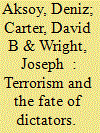

|
|
|
|
|
| Summary/Abstract |
The authors study the influence of domestic political dissent and violence on incumbent dictators and their regimes. They argue that elite with an interest in preserving the regime hold dictators accountable when there is a significant increase in terrorism. To pinpoint the accountability of dictators to elite who are strongly invested in the current regime, the authors make a novel theoretical distinction between reshuffling coups that change the leader but leave the regime intact and regime-change coups that completely change the set of elites atop the regime. Using a new data set that distinguishes between these two coup types, the authors provide robust evidence that terrorism is a consistent predictor of reshuffling coups, whereas forms of dissent that require broader public participation and support, such as protests and insurgencies, are associated with regime-change coup attempts. This article is the first to show that incumbent dictators are held accountable for terrorist campaigns that occur on their watch.
|
|
|
|
|
|
|
|
|
|
|
|
|
|
|
|
| 14 |
ID:
151149
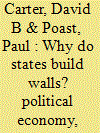

|
|
|
|
|
| Summary/Abstract |
Borders constitute the international system of states. Accordingly, states will, from time to time, take assertive measures to secure the border, with among the most aggressive strategies being the construction of physical barriers, which we refer to as “border walls.” Using original data on man-made border wall construction from 1800 to 2014, we theorize and find that in many cases, wall construction is about economic security. Significant economic disparities between the states will create incentives to illegally transport people or move goods readily available in the poorer country but highly regulated in the richer country. We find that economic disparities have a substantial and significant impact on the presence of a physical wall that is independent of formal border disputes and concerns over instability from civil wars in neighbors. In other words, “prominent examples such as the Maginot Line”, constructed largely out of fear of attack, is an exception, not the exemplar, of the reasons states construct border walls.
|
|
|
|
|
|
|
|
|
|
|
|
|
|
|
|
|
|
|
|
|